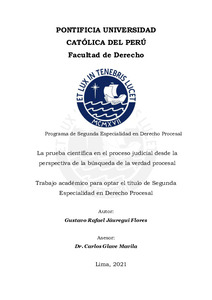| dc.contributor.advisor | Glave Mavila, Carlos | |
| dc.contributor.author | Jáuregui Flores, Gustavo Rafael | |
| dc.date.accessioned | 2022-04-05T21:03:22Z | |
| dc.date.available | 2022-04-05T21:03:22Z | |
| dc.date.created | 2021 | |
| dc.date.issued | 2022-04-05 | |
| dc.identifier.uri | http://hdl.handle.net/20.500.12404/22082 | |
| dc.description.abstract | El objetivo del trabajo es analizar si existe o no una sobrevaloración de la prueba
científica por parte de los jueces y con ello establecer si se ha creado un mito de
cientificidad procesal en la búsqueda de la verdad.
Desde un enfoque cualitativo, el estudio aplica el método de análisis de fuente
documental, principalmente de la doctrina y de la jurisprudencia nacional y comparada,
la misma que permite contrastar los hallazgos y resultados.
En ese sentido, se concluye que el juez peruano con una limitada formación científica,
integral, holística y argumentativa, depende y confía casi exclusivamente de los
resultados de los peritajes que se le ofrecen en los casos, sin realizar una valoración o
motivación al respecto, lo que podría significar una renuncia al concepto de que el juez
es perito de peritos, y dejando que los peritos o expertos sean quienes, en la práctica,
decidan y resuelvan el caso, poniendo en riesgo el derecho fundamental al debido proceso
y la búsqueda de la verdad objetiva y material. | es_ES |
| dc.description.abstract | The objective of this work is to address whether an overvaluation of scientific evidence
by judges exists or does not. Thereby, this would address the creation of the myth of
scientific based procedures in the search of truth.
From a qualitative approach, this study uses an analysis method. Specifically, the doctrine
and national and comparative jurisprudence, which allows to contrast the findings and
results.
This research shows that Peruvian judges with low scientific, holistic and argumentative
education rely on the result of the expert reports given to them in cases excluding a further
evaluation which results in the resignation of the role that the judges play as peritus
peritorum (expert of experts) and, even more severe, leaving the experts to be the ones
who, in practice, decide and resolve the process, which compromise the process and the
search for objective and material truth. | es_ES |
| dc.language.iso | spa | es_ES |
| dc.publisher | Pontificia Universidad Católica del Perú | es_ES |
| dc.rights | info:eu-repo/semantics/openAccess | es_ES |
| dc.rights.uri | http://creativecommons.org/licenses/by/2.5/pe/ | * |
| dc.subject | Prueba (Derecho)--Perú | es_ES |
| dc.subject | Debido proceso | es_ES |
| dc.subject | Peritaje (Derecho procesal) | es_ES |
| dc.subject | Prueba pericial | es_ES |
| dc.subject | Procedimiento penal--Perú | es_ES |
| dc.title | La prueba científica en el proceso judicial desde la perspectiva de la búsqueda de la verdad procesal | es_ES |
| dc.type | info:eu-repo/semantics/bachelorThesis | es_ES |
| thesis.degree.name | Segunda Especialidad en Derecho Procesal | es_ES |
| thesis.degree.level | Título Profesional | es_ES |
| thesis.degree.grantor | Pontificia Universidad Católica del Perú. Facultad de Derecho | es_ES |
| thesis.degree.discipline | Derecho Procesal | es_ES |
| renati.advisor.dni | 42244498 | |
| renati.advisor.orcid | https://orcid.org/0000-0003-3545-761X | es_ES |
| renati.author.dni | 15359280 | |
| renati.discipline | 421109 | es_ES |
| renati.level | https://purl.org/pe-repo/renati/level#tituloSegundaEspecialidad | es_ES |
| renati.type | https://purl.org/pe-repo/renati/type#trabajoAcademico | es_ES |
| dc.publisher.country | PE | es_ES |
| dc.subject.ocde | https://purl.org/pe-repo/ocde/ford#5.05.01 | es_ES |






